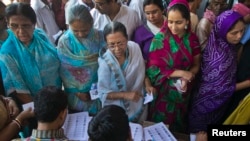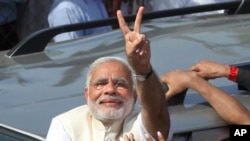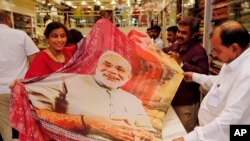NEW DELHI —
Exit polls from what is being billed as the world's largest democratic exercise show India's main opposition party is set to win the most seats in parliament.
It's unclear, however, if the Bharatiya Janata Party or BJP led by prime ministerial candidate Narendra Modi will win a majority in the 543 member lower house of parliament. National elections in India are extremely difficult to predict and exit polls have been wrong in the past.
The ruling Congress Party, which has been in power for a decade, has been hit by a series of high profile corruption scandals, high inflation and lagging economic growth.
India’s mammoth general election drew to a close Monday with polling held in 41 parliamentary constituencies - the last among 543 districts to vote. One of the contests involved the opposition's prime ministerial candidate, Narendra Modi, whose party is expected to emerge with the most seats, ending the rule of the Congress Party.
Usually flooded with Hindu priests and pilgrims, the ancient holy city of Varanasi on the banks of the River Ganges is a religious hub that seldom gets much attention at election time.
But on Monday it was the epicenter of one of the most prestigious contests in India’s mammoth election - Varanasi is one of the two seats from where Bharatiya Janata Party leader, Narendra Modi is seeking a place in parliament.
Modi has two main rivals. One is Ajay Rai - the candidate of the ruling Congress Party. The other is Arvind Kejriwal, founder of an anti-corruption party and a new high profile entrant to politics. Kejriwal has camped in the city for a month and run a door to door campaign to defeat Modi.
Varanasi is symbolic of the issues that have dominated this campaign. Although a tourist hub, the city remains dilapidated with poor infrastructure.
That is what Modi promises to fix - not just Varanasi, but throughout the country. He ran a massive countrywide campaign promising to reboot the Indian economy and bring development and jobs.
Modi has steered away from religious issues. However some saw his decision to seek election from one of the Hindu religion’s most holy cities as a reinforcement of his credentials as a Hindu nationalist leader.
Those credentials are what the Congress Party and Modi's other critics slammed during the campaign, calling him polarizing and divisive. They pointed to riots which swept the state of Gujarat while he was its leader in 2002, killing nearly 1000 people, mostly Muslims.
Bitterly fought elections
Independent political analyst Neerja Chowdhury says this has been one of India’s most bitterly fought elections.
“Modi was not only the prime ministerial candidate of the BJP [Bharatiya Janata Party], he was also the central issue of this election. The politics got divided between those who supported him and opposed him… it was a referendum around him. It’s been India’s most charged, it’s been very high stake election, very polarized election.”
Monday’s vote was held in three states - West Bengal, Bihar and Uttar Pradesh.
The results will be released Friday when votes from all 543 seats will be counted. Political analysts say the Congress Party could be headed for one of its worst performances due to deep anger with high inflation and corruption scams that marred its second term in office.
Although election forecasts in India can be unreliable, the BJP is expected to emerge with the highest tally.
But much will depend on how close it comes to the majority 272 mark in parliament. If the coalition it heads falls short, analyst Chowdhury says it will have to scout for allies.
“If they are near enough the majority figure, then it is not a problem, suppose they are 40-50 short of the majority figure, even then they will get allies because of the momentum that has been generated for them. And there has been nobody on the other side taking them on effectively,” said Chowdhury.
BJP leaders are expressing optimism that the party will form the next government - an optimism reflected in the country’s stock indices, which surged to a record high Monday as investors hoped for a business-friendly administration.
It's unclear, however, if the Bharatiya Janata Party or BJP led by prime ministerial candidate Narendra Modi will win a majority in the 543 member lower house of parliament. National elections in India are extremely difficult to predict and exit polls have been wrong in the past.
The ruling Congress Party, which has been in power for a decade, has been hit by a series of high profile corruption scandals, high inflation and lagging economic growth.
India’s mammoth general election drew to a close Monday with polling held in 41 parliamentary constituencies - the last among 543 districts to vote. One of the contests involved the opposition's prime ministerial candidate, Narendra Modi, whose party is expected to emerge with the most seats, ending the rule of the Congress Party.
Usually flooded with Hindu priests and pilgrims, the ancient holy city of Varanasi on the banks of the River Ganges is a religious hub that seldom gets much attention at election time.
But on Monday it was the epicenter of one of the most prestigious contests in India’s mammoth election - Varanasi is one of the two seats from where Bharatiya Janata Party leader, Narendra Modi is seeking a place in parliament.
Modi has two main rivals. One is Ajay Rai - the candidate of the ruling Congress Party. The other is Arvind Kejriwal, founder of an anti-corruption party and a new high profile entrant to politics. Kejriwal has camped in the city for a month and run a door to door campaign to defeat Modi.
Varanasi is symbolic of the issues that have dominated this campaign. Although a tourist hub, the city remains dilapidated with poor infrastructure.
That is what Modi promises to fix - not just Varanasi, but throughout the country. He ran a massive countrywide campaign promising to reboot the Indian economy and bring development and jobs.
Modi has steered away from religious issues. However some saw his decision to seek election from one of the Hindu religion’s most holy cities as a reinforcement of his credentials as a Hindu nationalist leader.
Those credentials are what the Congress Party and Modi's other critics slammed during the campaign, calling him polarizing and divisive. They pointed to riots which swept the state of Gujarat while he was its leader in 2002, killing nearly 1000 people, mostly Muslims.
Bitterly fought elections
Independent political analyst Neerja Chowdhury says this has been one of India’s most bitterly fought elections.
“Modi was not only the prime ministerial candidate of the BJP [Bharatiya Janata Party], he was also the central issue of this election. The politics got divided between those who supported him and opposed him… it was a referendum around him. It’s been India’s most charged, it’s been very high stake election, very polarized election.”
Monday’s vote was held in three states - West Bengal, Bihar and Uttar Pradesh.
The results will be released Friday when votes from all 543 seats will be counted. Political analysts say the Congress Party could be headed for one of its worst performances due to deep anger with high inflation and corruption scams that marred its second term in office.
Although election forecasts in India can be unreliable, the BJP is expected to emerge with the highest tally.
But much will depend on how close it comes to the majority 272 mark in parliament. If the coalition it heads falls short, analyst Chowdhury says it will have to scout for allies.
“If they are near enough the majority figure, then it is not a problem, suppose they are 40-50 short of the majority figure, even then they will get allies because of the momentum that has been generated for them. And there has been nobody on the other side taking them on effectively,” said Chowdhury.
BJP leaders are expressing optimism that the party will form the next government - an optimism reflected in the country’s stock indices, which surged to a record high Monday as investors hoped for a business-friendly administration.






